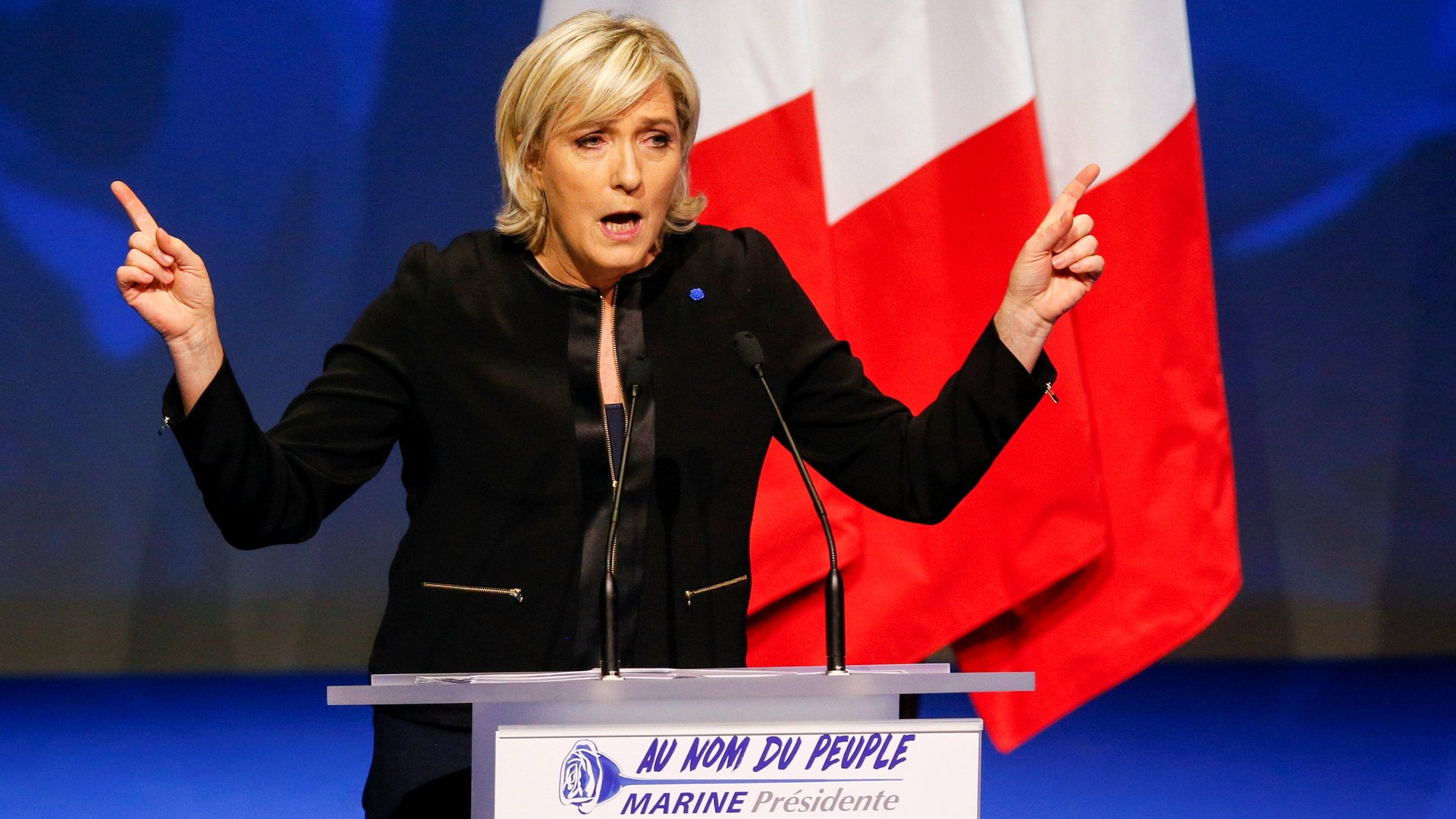Le Pen is campaigning on how bad the EU is for France’s economy, just as things are improving
Marine Le Pen kicked off her presidential campaign last weekend with all the populist flourish of Donald Trump. The crowd at the rally in Lyon chanted “this is our country!” back at the leader of France’s far-right National Front party. Le Pen promised to “restore freedom” to France if she wins May’s election. Her 144-point plan (pdf) to do this includes holding a referendum on European Union membership and returning to a national currency, instead of the euro.


Marine Le Pen kicked off her presidential campaign last weekend with all the populist flourish of Donald Trump. The crowd at the rally in Lyon chanted “this is our country!” back at the leader of France’s far-right National Front party. Le Pen promised to “restore freedom” to France if she wins May’s election. Her 144-point plan (pdf) to do this includes holding a referendum on European Union membership and returning to a national currency, instead of the euro.
Le Pen said this year’s election was a choice between her opposition “globalist” candidates and a “patriotic” candidate, which she alone represents. She said the EU was a “failure” which had “kept none of its promises.” She said the other candidates, who wanted to stay in the euro, will ”drag down our economy, keep mass unemployment going, and give the EU leverage for imposing its views, its inept directives, its millions of migrants.”
Yet just as Le Pen is urging the French to turn their backs on the EU and the euro, the region’s economy is finally starting to show a sustained recovery (paywall) from the doldrums of the 2008 financial crisis and 2012 sovereign debt crisis.
In 2016, euro-zone GDP grew at 1.7%, slightly faster than the US’s 1.6% (paywall). That’s on the back of sturdy domestic demand, according to the European Central Bank, and disposable income is expected to grow. Meanwhile, unemployment in the 19-country bloc fell into single digits for the first time since the financial crisis and deflation is no longer a threat. Though Greece and Italy continue to struggle, more economies in the euro zone are doing well than are doing badly, according to economists at Swiss bank UBS.
Europe has a reputation for sluggish growth that drags down the global economy, but this year the conventional wisdom is too pessimistic, says Credit Suisse. Economic sentiment within the euro zone is significantly stronger for the start of 2017.
None of this necessarily matters to the voters Le Pen is talking to, though.
At Le Pen’s rally her supporters were factory workers and former soldiers, according to the New York Times (paywall). The 48-year-old party leader describes a France where blue-collar jobs have been taken by foreigners and the forces of globalization.
That message may have traction. Compared to the rest of Europe, France’s economy has been weak in recent years, particularly relative to neighboring Germany’s. Nor has it enjoyed the quickening recovery of Spain. It grew just 1.1% last year, well below the euro-zone average and slightly slower than the year before. Unemployment is only just below 10% and the current president, François Hollande, has an approval rating of just 4%, in part because he pushed through unpopular labor reforms. Dean Turner, an economist at UBS, said that even though the French economy is starting 2017 on a stronger footing, it’s too early to see a return to pre-crisis growth levels because France still needs deep structural reforms.
By 2030, France will have lost its place as one of the world’s 10 largest economies, according to a report by Pricewaterhouse Coopers. This will come with a long-term slowdown in the European economy. By 2050, the EU’s share of global GDP will be smaller than India’s.
For now, things aren’t all bad. France is still the sixth largest economy in the world and smaller only than Germany in the euro zone. Hélène Baudchon, an economist at French bank BNP Paribas, says the outlook for the nation’s economy is good. In the last quarter of 2016, growth was twice as fast as in the previous three months. The full-year growth rate was slowed down mostly by temporary factors such as labor strikes and bad weather, but underneath there was strong consumer spending and corporate investment. Business confidence (paywall) is near the highest its been since 2011.
Baudchon says France will grow more slowly this year than the euro-area average because its coming from a lower point, but by next year the gap in GDP growth will close.
But as with Brexit and the election of Donald Trump, economic data might not matter that much. In both cases, voters, particularly from rural parts of the UK and US, felt that they had lost out from globalization. It didn’t matter that economists told them their national employment was historically high and economic growth was among the fastest in the developed world, if they perceived their own living standards and wages as failing to improve—and foreigners as being to blame.